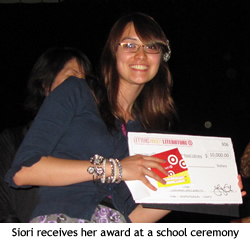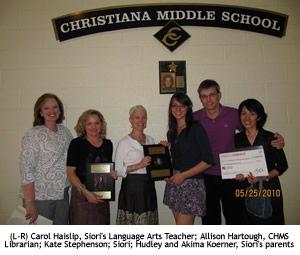Catcher in the National Spotlight
Siori Koerner’s letter to J.D. Salinger wins the Murfreesboro eighth-grader top honors in the Letters About Literature contest
Where I’m from, people know me as the ‘weird girl’—I’m not into the latest trends in pop culture, and I’m not bubbly and air-headed; nor am I the dark, angsty teen aged disaster of the cultural norm. I’m different; therefore, I’m strange.
 It began as just another school essay, with a due date for a grade. The assignment: to choose a book that speaks to you—any book you wish—and write a letter to its author, explaining how the story sheds new light on your own life experiences. Back in the fall, Siori Koerner, 14, an eighth grader from Murfreesboro, giggled with her friends as they wrote and revised their letters. This month she learned that her letter—written to J.D. Salinger about The Catcher in the Rye—had taken top honors in the 2010 Letters About Literature contest, a national reading-promotion program of the Center for the Book in the Library of Congress.
It began as just another school essay, with a due date for a grade. The assignment: to choose a book that speaks to you—any book you wish—and write a letter to its author, explaining how the story sheds new light on your own life experiences. Back in the fall, Siori Koerner, 14, an eighth grader from Murfreesboro, giggled with her friends as they wrote and revised their letters. This month she learned that her letter—written to J.D. Salinger about The Catcher in the Rye—had taken top honors in the 2010 Letters About Literature contest, a national reading-promotion program of the Center for the Book in the Library of Congress.
Koerner’s letter was chosen from nearly 70,000 submissions overall, making her one of six national winners. Each prizewinner takes home a $500 Target gift card (Target is the program’s main funder) and a $10,000 grant for a public or school library of the winner’s choice. The award stipulates that funds must be used to buy reading materials for young readers or to pay for programming such as author visits and writing workshops.
Launched in 1992, Letters About Literature gives students across the country an incentive to practice reflective writing, a pedagogical approach that proponents say does a better job of getting kids intellectually engaged with literature than book reports or critical analysis can. In addition to allowing students to practice writing for a specific audience, this kind of reflective writing asks them to connect with a book individually, subjectively, instead of summarizing the plot or spitting back what she’s been told the salient themes are. “And that’s important, because if the teacher limits instruction to one correct way of interpreting a text, typically the student does little more than memorize or recall details,” explains Cathy Gourley, Letters About Literature’s national project director. “In reflective writing, she must examine her emotional response a bit more closely, which often leads to personal insight and deeper comprehension of the text. And since there’s no one correct response, she can—and often does—gain confidence in her expression of ideas.”
This strategy seemed to have the desired effect for Koerner, who acknowledges that in the process of writing her letter to Salinger, “all this personal stuff started to flow out. Thank God my teacher’s not judgmental. And because of that, I kind of held that paper a little more high than others I’ve written. But it was really just an assignment until I won—and then I was like, ‘Oh, my gosh; this paper’s gold!'”
Koerner’s teacher at Christiana Middle School, Carol Haislip, remembers reading a rough draft of the letter and thinking it would surely win at least honorable mention at state level. “It showed a depth of thought beyond her years—beyond what the average twelve- or thirteen-year-old usually garners from a book,” she says. She admired the honesty of the writing—the way that Koerner saw herself reflected in both the good and bad qualities of Catcher‘s iconic teen character, Holden Caulfield.
Caulfield, quick to criticize others for being phony and superficial, “was like my rebellious twin brother,” Koerner mused in her letter. But as she thought carefully about the book, she made a surprising realization. “He constantly lies to all who talk to him and always thinks foul things while attempting to act like a respectful young man,” she writes. “Therefore, is he not superficial and fake as well? I soon realized that it was not only those around me that were deceptive and ‘phony.’ I was, too. Catcher in the Rye was my wake-up call.”
Confronting one’s identity, as Koerner does in her letter to Salinger, is one of a “tapestry of themes” that often show up in the submissions to Letters About Literature, says Gourley. Students frequently write about their struggles with self-esteem and bullying. Coping with loss is another perennial theme. “That loss may be the death of an animal, a parent or grandparent, or friend. It may be the loss of innocence through abusive relationships. Sometimes it is just loss through aging, changing, and not knowing what the future may hold,” Gourley says. Clearly, writing these letters often holds not just educational but therapeutic benefits for the students, who range in age from nine to eighteen.
 For a letter to shine in competition, however, it must clearly display the writer’s personality, notes Jinx Watson, Humanities Tennessee board member and a state-level judge for the contest. “I ‘hear’ the writer making sense of his or her reading, and I sense the angst or humor that this writer enjoyed while reading, and which therefore shows in his or her writing.”
For a letter to shine in competition, however, it must clearly display the writer’s personality, notes Jinx Watson, Humanities Tennessee board member and a state-level judge for the contest. “I ‘hear’ the writer making sense of his or her reading, and I sense the angst or humor that this writer enjoyed while reading, and which therefore shows in his or her writing.”
Koerner is not the first young Tennessean to snag a national award from Letters About Literature; in fact, the Volunteer State has, remarkably, boasted a national winner in four of the past five years. This year Malli Swamy, a student at White Station High School in Memphis, also took home an honorable mention for her letter to Paulo Coehlo, author of The Alchemist.
Tennessee’s unique judging process may play a role in its winning record: it is the only state that still runs its own state-level contest. In forty-nine other states, all submissions—almost 68,000 of them—are sent straight to the national office for evaluation.
In Tennessee, by contrast, entries—this year 1,721—are screened by a group of nearly twenty judges in the initial selection round. The best of the batch then go on to state-level judges, who choose the state winners. Those winning letters proceed to the national round, to be evaluated by a panel of experts including notable authors and children’s publishing professionals. Six winners—two from three age brackets—emerge from this final level of judging. “I think the attention we give to each letter early on really helps,” says Lacey Cook, program officer with Humanities Tennessee. “Our process gives more attention to each letter than readers in the national office possibly can.”
Watson, who reads Tennessee high school students’ submissions at state level, says the letters always give her something to think about. This year, there were several writers, like Koerner, who confronted their own egocentrism; others evaluated the role of new technologies in their lives. Still others meditated on old age and death, or reflected on class, ethnicity, and religion. Their responses, she says, tend to be particularly authentic and passionate because they are allowed to write about books they have selected, rather than texts that have been assigned to them.
And that free rein holds appeal for the judges, too, who stand to have their own literary horizons broadened each year. “There are authors whose names we see every year—Lois Lowry, Carl Hiaasen. But we also learn of new authors—new to us, anyway—who have been writing and publishing wonderful material but aren’t the ‘A-list,’ so to speak,” says Gourley. “This year, an Alaskan child won a national award for a letter to an Alaskan author, Velma Wallis, who was unknown to us. That’s one real excitement of this program.”
Koerner initially picked up The Catcher in the Rye on the recommendation of her father, Hudley Koerner, an avid reader who took second place in a poetry contest when he was Koerner’s age. (“She one-upped me,” he says proudly.) “He told me it was good, but he refused to tell me the ending, which got me to buy it,” Siori says. She chose to write about the book because it seemed easily relevant to her life. “It doesn’t really tell a story; it talks to you. It’s not like those really boring, stuffy books that talk more about the story than the character. I like books that talk more about the characters than the stories.”
In the way she talks about her life with a confidence and ease that seem beyond her years, it’s clear that Siori Koerner is remarkable—”different,” as she discusses in her letter to Salinger—in a lot of good ways. And she’s totally fine with that. But when she describes what she thinks sets her apart from her middle-school peers, her take on different sounds more like extremely well-adjusted. “I think it’s a different way of thinking. While most people are worrying about the now and who’s dating who, I’m worrying about how I’m going to get into college. I’m actually really glad I’m different. Because when you stand out, you get noticed, and when you get noticed good things happen.”
But when asked what thrilled her most about winning the Letters About Literature contest, Koerner comes across as more like typical teen: “That would have to be the gift card. I can never have too much money.” What will she buy with it? If you guessed books, you may have guessed wrong. “I’m thinking about buying a Wii and a couple of games, and then girls’ stuff—makeup, clothes, shoes.”
To read Siori Koerner’s letter to J.D. Salinger, click here.


